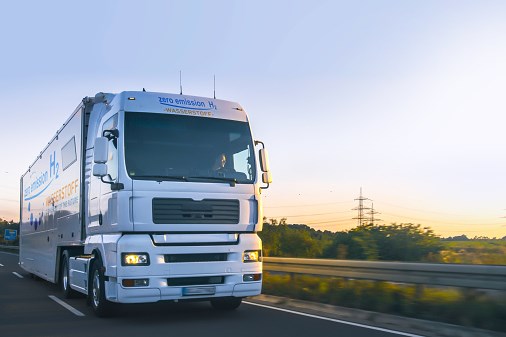Hexagon Purus, Ballard to power Class 6 fuel cell electric truck
Hydrogen truck will take advantage of Ballard’s FCmove fuel cell module and Hexagon’s Type IV hydrogen storage systems and ProPack battery storage for zero-emissions commercial transportation.

Photo Credit: Getty Images
Hexagon Purus (Ålesund, Norway) and Ballard Power Systems (Burnaby, Canada) are collaborating to produce Class 6 and 7 fuel cell electric trucks powered by Hexagon Purus’ turnkey electric drivetrain and composite hydrogen storage system solutions and Ballard’s fuel cell module.
According to both partners, this truck will provide a range of more than 400 miles and refueling times comparable to conventional trucks. It is a zero-emission solution for fleet owners with demanding operations, moving goods through the “middle miles,” without the need to expand their fleet. The first prototype of the hydrogen truck will be delivered in the Q2 2022.
“Our goal is to drive energy transformation through zero-emission mobility solutions. We look forward to leveraging our extensive experience in lightweight, reliable and safe hydrogen storage and battery electric drivetrain systems, and together with Ballard, pave the way to zero emission commercial transport,” says Todd Sloan, EVP, Hexagon Purus.
Ballard’s eighth generation of the fuel cell module, the FCmove, is reported to provide a zero-emissions electric power source, with the reliability of more than four decades of technology development and more than 50 million miles of on-the-road experience.
Similarly, Hexagon Purus’ lightweight Type IV hydrogen storage systems, high energy density ProPack battery storage and fully integrated electrified accessory systems deliver light, efficient and long-range zero-emissions power for electrified commercial vehicles.
Partners note to look for this truck to enter California’s Hybrid and Zero-Emission Truck and Bus Voucher Incentive Program (HVIP) eligible vehicle list in 2022. First fleet deployments will be in and around the Los Angeles Basin area, a market with some of the nation’s most stringent air quality regulations. Currently, California is reported to be leading the U.S. in supporting the deployment of hydrogen fuel cell technology, including development of a statewide hydrogen fueling infrastructure to service fuel cell vehicles.
Both Hexagon Purus and Ballard have provided hydrogen solutions and equipment to industry for decades. This collaboration of two industry veterans is expected to enable accelerated adoption of hydrogen and fuel cells in heavy-duty transport applications.
“Fuel cell and hydrogen technologies will enable the decarbonization of the heavy-duty transportation sector with long range and quick vehicle refueling, without compromising on payload,” says Nicolas Pocard, vice president, marketing and strategic partnership. “Our partnership with Hexagon Purus will deliver a high-performance zero-emission Class 6-7 truck with the integration of state-of-the-art fuel cell engine, hydrogen storage and electric drivetrain.”
Related Content
-
Sulapac introduces Sulapac Flow 1.7 to replace PLA, ABS and PP in FDM, FGF
Available as filament and granules for extrusion, new wood composite matches properties yet is compostable, eliminates microplastics and reduces carbon footprint.
-
The lessons behind OceanGate
Carbon fiber composites faced much criticism in the wake of the OceanGate submersible accident. CW’s publisher Jeff Sloan explains that it’s not that simple.
-
TU Munich develops cuboidal conformable tanks using carbon fiber composites for increased hydrogen storage
Flat tank enabling standard platform for BEV and FCEV uses thermoplastic and thermoset composites, overwrapped skeleton design in pursuit of 25% more H2 storage.















